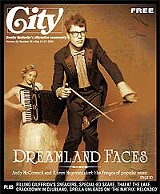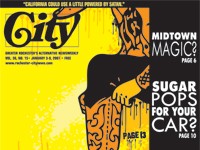Dreamland Faces
Andy McCormick and Karen Majewicz skirt the fringes of popular music
By Frank De Blase[
{
"name": "500x250 Ad",
"insertPoint": "5",
"component": "15667920",
"parentWrapperClass": "",
"requiredCountToDisplay": "1"
}
]
It could be any sunny Saturday morning. Amidst the produce and the milling melting pot of the Public Market, you stroll along haggling with merchants, minding your own affair, when you find yourself drawn to the north corner of the market.
At first it's merely the sound of the accordion and the warm scent of the roasted bean wafting out of Java Joe's. Quaint, romantic, lilting, the accordion's refrain immediately sets the mood for sipping coffee. But it's when a particular angelic wail cuts the air that folks' ears really perk up. It's a sweet and soaring tone, one of the prettiest things you'll ever hear. It's Andy McCormick. And he's playing a saw.
McCormick and his partner, accordionist Karen Majewicz, have been playing Saturday mornings to delighted patrons in Java Joe's for the past two months. Joe's bustles on Saturdays with coffee aficionados, friends, neighbors, politicians, gadabouts, eccentrics, odd-balls, and an endless array of John Does lured in simply by the duo's hauntingly beautiful music.
McCormick sings and accompanies himself on the accordion, doing renditions of smoky classics as well as contemporary tunes that blend perfectly with his already eclectic repertoire and delivery. The Smiths one minute, Gershwin the next. It's when Majewicz straps the accordion to her small frame and McCormick whips out the saw that things cross into yet another dimension of unconventional beauty. For here is a bespectacled, unassuming, tall drink of water drawing a bow across a conventional saw. Not a cleaned-up musical facsimile, but a rusty, albeit sharp, saw. And it sounds magnificent.
Born in Alaska, McCormick grew up singing folk songs with his family. He began as an upright bassist in Rochester with the group The Fun Factory --- an eclectic ensemble that played happy hours at The Bug Jar during the Bob Duke era.
"We would all gather around one mic and sing my own little pop songs, some standards, all at once," he says. A fellow band mate, Todd Whitman, hipped him to the saw. McCormick played the bass until the saw and practicality stepped in.
"Well, I gave up playing bass a few years ago so I could ride my bike everywhere," he says. "The saw and the accordion were more portable so that was, like, a big draw. Plus it's really loud and it's just pretty, you know? It just cuts through the noise."
I played around with various saws until I found a good one. McCormick effortlessly draws the bow across the edge of this unconventional instrument, making it seem so simple.
"Oh, it's easy," he says. "Anyone can do exactly what I do." I spent 10 minutes with the bow and saw, copped McCormick's motions, and emitted little more than a few rusty squeaks and hisses. "Easy." Right. "Of course I might just be saying that," he says with a grin. "You've gotta wiggle your leg a lot. Like a dog."
When played correctly, the saw emits a tone with no apparent beginning or end. Warbling without consonants. What remains is a heartbreakingly pure tone.
He has toured France, playing saw ("la scie musicale they called it," he says) and accordion with two bands, Tulip Sweet and Larmes de Colere. Both were based in Minneapolis, a town he landed in unexpectedly.
"I was hitchhiking east from Seattle and got picked up in Fargo [by the police]," he says. "They put all the hitchhikers in a room and made us wait for, like, a day until somebody came in and asked us if we wanted to do construction in Fargo and live at the YMCA, or if we wanted Greyhound tickets to Minneapolis." McCormick chose the latter, and stayed in the Twin Cities for six years.
McCormick's taste is as colored and varied as his adventures. As we spoke in the back of the Little Bakery, where he works, McCormick's boombox was blasting music from a 15-volume set of late '60s Ethiopian pop. Specifically, Alemaye Eshete, "the Ethiopian James Brown," according to McCormick.
McCormick has released a handful of tapes and CDs, full of solo recordings and collaborations with Majewicz. They're available at all local record stores and at the duo's live engagements.
McCormick has been playing accordion for "probably eight to 10 years," and refers to Majewicz's proficiency as his ambition. "I want to be as good as she is on the accordion."
Karen Majewicz is a towheaded little thing who hefts an instrument essentially as big as she is. Her little-yet-powerful voice and old-time phrasing might remind you of a jazzier Olive Oyle. She has been squeezing the accordion for roughly eight years and can read the dots too, having studied Ethno-Musicology at The University of Washington in Seattle.
"I'd sort of been searching around or an instrument that I felt really suited me," she says. "And I didn't want to play classical instruments anymore, necessarily."
It was McCormick who gave Majewicz her first accordion. "Just a little 12-bass Hohner," she says. "So I took it out to a park and was like, 'Oh, this is the instrument for me.' I knew immediately. It made sense to me that it was portable. I was developing an interest in a lot of folk music from other countries, and even some pop music from other countries." Her growing love of the accordion and its music eventually brought her back east.
"I had really focused on the accordion," she says. "And I just sort of had this realization that if you take your life and focus on something that's kind of on the fringes of popular culture, not totally esoteric, but not something you see everyday, I felt it could really take you to some interesting places, and find some interesting people." After graduating, Majewicz moved to Richmond, Virginia, where she'd heard the Hohner Accordion Company had a factory. "I just went there, applied, and got lucky." She worked for Hohner as an accordion repairperson for two years. It was here where she met the person who would become her major influence.
"There was a fellow who worked there named Erich Albus," she says. "He was 75. He came from Germany and had been playing the accordion his whole life. He used to play polkas and waltzes in a pretty simple style. It just came across so nicely and relaxed, and I realized that you don't have to play really complicated virtuosic music to be musical. When I listened to him I sort of realized the style I was hoping to come into."
Majewicz and McCormick began performing two years ago as Dreamland Faces, mixing standards and contemporary oddities cleverly and cohesively.
"I really like songs that are not quite as well known," McCormick says. "We do play standards that everybody knows, like 'All OF Me.' But I make sure we play the intro that most people don't know. It brings me back to the time when I didn't know that song and I wasn't sick of it. We try to play requests, but we usually end up playing something similar to what they asked for. People usually ask me to play something Italian."
"At first we were doing original songs that we had both written," Majewicz says. "Then we started getting interested in the old standards from the '20s and '30s. I just think the pop songs from that era are a little more sophisticated, harmonically at least." Harmonically, the duo's choice of material makes sense. What era it comes from or who writes it may surprise a few people.
"I try a lot of things," says McCormick, who will vacillate smoothly between Lionel Hampton's "Midnight Sun" to The Smiths' "Last Night I Dreamt Somebody Loved Me." The contemporary twists don't stop there, with Blondie and The Kinks tossed in atop the vintage vaudeville. McCormick does have his limits though.
"If we're sick of something, we won't play it," he says. "I don't like patriotic songs. There's something sickening about them."
"It seems that we're drawn to a lot of tunes that have kind of a melancholy mood to then," Majewicz says. "That's just life, I suppose," deadpans McCormick. "I certainly don't look for that. But a lot of them seem to be about death and divorce and things." Even McCormick's contemporary choices, like "Bohemian Rhapsody," seem morose.
"Andy does them by himself," Majewicz says. "I don't know any songs that are new. I'm just too busy learning old songs, I guess."
Majewicz plies these classic gems to appreciative seniors at nursing homes like Kirkhaven and St. Ann's Home.
"I love playing the nursing homes," she says. "They all know these songs nobody else in my life has ever heard of. They sing along almost the whole time."
Always an instrumentalist, Majewicz had to grow into her voice. She sounds at once boop-boop be-doop cute as hell and as if she were blasting out of an old gramophone.
"I was much too shy to sing for a very long time," she says. "I started doing it at the nursing homes and at Bullwinkle's [the oddball Lake Avenue café where she sits in whenever she can]. I sing in this high, wavery voice, and all the old guys really seemed to like it. It's just the way I always sang, and I really wasn't aware that it sounded characteristic of something until people mentioned it."
McCormick and Majewicz set up unassumingly next to the gutted-out piano at Java Joe's. The regulars have just as much fun watching the astonished faces of newcomers as they do enjoying the music. They've no doubt seen accordions before, but they can't get past the "guy with the saw" and its unbelievable beauty.
"It's great," says Java Joe. "Everyone thinks they're sitting in a café in Paris." Scratching his Italian head, Joe reconsiders. "I take back that Paris comment. It's like being in Rome." Even when McCormick belts out Blondie's "Dreaming," the timeless, somewhat European feel lingers. Regardless, audiences are eating the duo up.
"The crowds at Joe's are wonderful," says McCormick. "And the people who work the counter are very tolerant. I don't know how they can stand it."
He and Majewicz are working musicians, laboring on the edge in a country where even ordinary musicians are dismissed as being odd just by their choice of occupation. McCormick shrugs off the skepticism, recalling his time in France.
"It was so exciting to be somewhere where people were like 'Oh, you're a musician? Here's your free meal, and your free place to stay. You can have as many drinks as you want tonight. And if you need anything, anything at all, don't hesitate to wake me up. Call this number,'" he says. "Whereas here, they're like 'Oh, you're a musician?' And they sort of, like, look over your shoulder. 'What else do you do?'"
Dreamland Faces play with The Horn Band on Tuesday, June 10, at Monty's Korner, 355 East Avenue, at 8 p.m. 263-7650. Free.
Speaking of...
-

Album review: 'Icebreaker'
Apr 12, 2017 - More »









